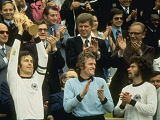Political Football:
Beckenbauer vs Breitner
Updated on 31 July 2007
Simon Kuper selects ultra-bourgeois Franz Beckenbauer and Maoist teammate Paul Breitner for his Political Football First XI.
It barely made the news outside Germany. Bayern Munich are planning to give their ex-player Paul Breitner a contract as an adviser. "Once an expert, always an expert," explained Bayern's general manager Uli Hoeness, who as a young man once hid Breitner in the cellar of their shared house.
Franz Beckenbauer, Bayern's president and a fellow world champion of Breitner's and Hoeness's in 1974, had presumably approved the contract. Breitner said he was so happy at Bayern he didn't need a contract, but that wasn't the point. One of postwar Germany's great political conflicts had quietly ended.
When the teenaged Breitner came to Bayern from a small southern German town in 1970, he was one of many young Germans inspired by the student rebellions of 1968. In an unfocused way, "Red Paul" was a rebel. He grew a beard, claimed to read Lenin and Marx, and when called up for the army hid in the cellar while Hoeness told the military police, "He isn't here."
Most famously of all, Breitner had himself photographed seated in a rocking chair beneath a poster of Mao Tse-Tung, while supposedly reading a Chinese communist propaganda newspaper. In an added flourish, a Boxer dog sat on the floor beside Breitner.
Most famously, Breitner had himself photographed seated in a rocking chair beneath a poster of Mao Tse-Tung, while supposedly reading a Chinese communist propaganda newspaper.
Today the picture seems hilarious. Breitner is obviously trying to look like a child's idea of a European intellectual, with beard and newspaper, as if he were Lenin in Switzerland waiting for the revolution instead of a left-back. By the time of the photograph Mao had killed millions of Chinese, but Breitner, like most western Maoists, was not bothered about detail.
As a left-back, Breitner fit perfectly into the brilliant Bayern team. As a leftie, he could not have chosen a worse club. The dominant figure at Bayern was the libero Franz Beckenbauer. Like Breitner, Beckenbauer thought about life beyond football, but came to the opposite conclusions. When Breitner saw Germans in power, he wanted to rebel. Beckenbauer wanted to join them.
The "Kaiser" was an instinctive bourgeois. He had married young - to the first in a parade of elegant blondes - bought a semi-detached house, and taken elocution lessons. He always tried to ally himself with the powers that be: with the conservative Christian Social Union that has ruled Bavaria for decades, and with Germany's mighty right-wing tabloid Bild Zeitung.

Bourgeois: der Kaiser
Inevitably Breitner got up his nose. In fact he got up the noses of most conservative Germans when he said, for instance, that listening to the national anthem before international matches "ruins the concentration". Opposing fans who bought into Breitner's pose would scream "Maoist! Communist!" at him. His response: "You know what? I'd really wanted to play normally. But you're shouting such rubbish that to shut your mouths I'll play even better."
Sadly for Breitner, although he was a demon of the right, he never became a hero of the '68 left. That role went to the long-haired hedonist Gunter Netzer, even though Netzer was apolitical. Breitner was too weird, difficult, unglamorous to be a hero.
Yet Breitner was much more like Beckenbauer than he let on. Both men were born capitalists. Breitner, who drove a Maserati, once said he would market his backside if necessary.
Email us your Political Football suggestions
Over the coming months Simon Kuper will be nominating his Political Football First XI - 11 footballers whose lives have acquired a dimension outside the sport they play.
But we want to know who you would include. It doesn't have to be an entire team (although that would be fascinating) - just a player for whom life has meant more than a mansion in Belgravia and a fleet of 4x4s.
Email your suggestions to Channel 4 News by clicking here.
When the West German team of 1974 went on strike just before the world cup, demanding a bonus of 100,000 Deutschmark each for winning the trophy, Breitner and Hoeness were the ringleaders. In camp preparing for the tournament, Breitner packed his bags twice in one night, ready to go home if the players' demands were rejected. Beckenbauer later celebrated the players' revolt as a demonstration of their "own strength".
After Breitner and Beckenbauer stopped playing their careers diverged. Beckenbauer became the German establishment; Breitner, the opposition. The Kaiser, as popular off the field as he ever was on it, came to tower over the Federal Republic, bigger than its footballers or intellectuals or chancellors.

World Cup winners, 1974
The only dissent came from the remnants of 1968, who considered him too successful, rich, greedy, rightwing, unreflective, unapologetic about the German past, celebratory and Bavarian. It's no coincidence that Danny Cohn-Bendit, who as "Danny the Red" had incarnated the 1968 student revolutions, founded an "Alliance against Franz" to stop Beckenbauer becoming president of UEFA.
Breitner soon gave up pretending to be a lefty, but he always remained a rebel, opposing whoever happened to be running things. "A rebel is someone who doesn't just accept everything," he says. When Beckenbauer managed Germany, Breitner called him "the gravedigger of football".
Franz Beckenbauer could make Chancellor Gerhard Schroder's week just by dropping into his office for a late-night bottle of wine.
But it was an unequal struggle. Beckenbauer won the world cup of 1990 as a manager, brought the 2006 world cup to Germany, and could make Chancellor Gerhard Schröder's week just by dropping into his office for a late-night bottle of wine.
Breitner, meanwhile, had to do most of his shouting as a newspaper columnist, because nobody in football would employ him. When the German FA did name him Germany's manager in 1998, he lasted only 17 hours in the job because too many officials refused to accept him.
Only now have Bayern welcomed him back into the family. 1968 is over. Mao is dead. Beckenbauer won, but so did the multimillionaire Breitner.
Simon Kuper writes for the Financial Times
